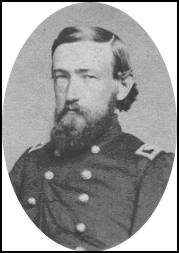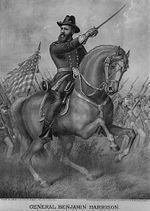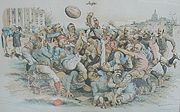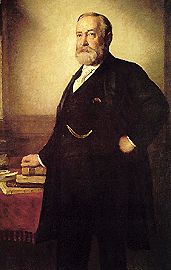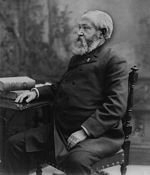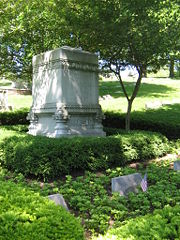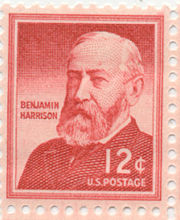Benjamin Harrison
2008/9 Schools Wikipedia Selection. Related subjects: USA Presidents
|
Benjamin Harrison
|
|
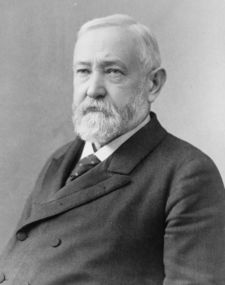 |
|
|
|
|
|---|---|
| In office March 4, 1889 – March 4, 1893 |
|
| Vice President | Levi P. Morton (1889-1893) |
| Preceded by | Grover Cleveland |
| Succeeded by | Grover Cleveland |
|
United States Senator
from Indiana |
|
| In office March 4, 1881 – March 3, 1887 |
|
| Preceded by | Joseph E. McDonald |
| Succeeded by | David Turpie |
|
|
|
| Born | August 20, 1833 North Bend, Ohio |
| Died | March 13, 1901 (aged 67) Indianapolis, Indiana |
| Nationality | American |
| Political party | Republican |
| Spouse | Caroline Lavinia Scott Harrison (1st wife) Mary Scott Lord Dimmick Harrison (2nd wife) |
| Alma mater | Miami University |
| Occupation | Lawyer |
| Religion | Presbyterian |
| Signature | |
Benjamin Harrison ( August 20, 1833 – March 13, 1901) was the twenty-third President of the United States, serving one term from 1889 to 1893. Harrison was born in North Bend, Ohio and moved to Indianapolis, Indiana at age 21 were he became a prominent state politician. During the American Civil War Harrison served as a Brigadier General in the XXI Corps of the Army of the Cumberland. After the war he unsuccessfully ran for the governorship of Indiana and then later was elected to serve as a senator from Indiana.
His presidential administration is best known for a series of legislations including the McKinley Tariff and federal spending that reached one billion dollars. Democrats attacked the "Billion Dollar Congress" and defeated the Republican Party in the 1890 mid-term elections, as well as defeating Harrison's bid for reelection in 1892. He is the only president from Indiana.
Harrison's wife died near the end of his presidential term and after failing to win reelection he retired to his home in Indianapolis where he remarried, wrote a book, and represented the Republic of Venezuela in an international case against Great Britain. In 1900 he traveled to Europe and after a brief stay returned to Indianapolis. Harrison died the following year.
Early life
A grandson of President William Henry Harrison and great-grandson of Benjamin Harrison, V, Benjamin was born on August 20, 1833, in North Bend, Hamilton County, Ohio, as the second of eight children of John Scott Harrison (later a U.S. Congressman from Ohio) and Elizabeth Ramsey Irwin.
His early schooling was done in a one room school house near his home. In 1845 he was provided with a tutor to help him with college preparatory studies. In 1847 he was enrolled in a newly built farmer's college called Gary's Academy near Cincinnati, Ohio which he attended for two years. In 1850 Harrison transferred to Miami University in Oxford, Ohio, where he was a member of the fraternity Phi Delta Theta and graduated in 1852. Harrison attended Miami with John Alexander Anderson, who would become a six term congressman, and Whitelaw Reid, who would be Harrison's Vice President. While attending Miami University, Harrison joined a Presbyterian church, like his mother, he would remain a member for the rest his life. After completing college Harrison took up the study of law in the Cincinnati law office of Storer & Gwynne, but before completing his law studies Harrison returned to Oxford to marry.
On October 20, 1853, Harrison, 20, married Caroline Lavinia Scott, 21, in Oxford, Ohio. She was the daughter of the University's president. The wedding was performed by her father, Rev. John W. Scott. The Harrisons had two children, Russell Benjamin Harrison ( August 12, 1854 - December 13, 1936) and Mary "Mamie" Scott Harrison McKee ( April 3, 1858 - October 28, 1930).
Lawyer
After marriage Harrison returned to live on his father's farm were he finished his study of law. That year he inherited $800 after the death of an aunt, he used the money to move to Indianapolis, Indiana in 1854. He was there admitted to the bar and began the practice of law in the office of John H. Ray. The same year he became a crier for the Federal Court in Indianapolis making $2.50 per day. He was made an honorary member of Delta Chi (which at the time was a legal professional fraternity) at Michigan University.
While in Indianapolis, Benjamin Harrison was both the first President of the University Club, a private gentlemen's club and the first President of the Phi Delta Theta Alumni Club of Indianapolis, the fraternity's first such club. Both clubs were still in existence in 2008.
In 1858 Harrison entered into a law partnership opening an office named Wallace & Harrison. Harrison was elected as a Republican reporter of the decisions of the Indiana Supreme Court in 1860, his first foray into politics. During the election he debated Thomas Hendricks, the Democratic candidate for governor and future Vice President of the United States, on behalf of the Republican Party. Wallace was elected clerk in 1860 and Harrison changed partners, opening a new firm named Fishback & Harrison were he worked until his entry into the army.
Civil War
In 1862 President Abraham Lincoln issued a call for more recruits to join the Union Army. While visiting Governor Oliver Morton, Harrison found him to be distressed over the shortage of men volunteering for the latest call. Harrison is quoted as saying to the governor, "If I can be of any service, I will go". Morton then asked Harrison if he could help recruit a regiment, but that he could not ask him to serve. Harrison then proceeded to raise a regiment by recruiting throughout northern Indiana. He was offered command of the entire regiment by Morton, but he declined because of his lack of military experience, and he was commissioned as a Second Lieutenant. In August 1862, when the regiment left Indiana to join the Union Army at Louisville, Kentucky, Harrison was promoted by Morton to the rank of Colonel and his regiment was commissioned as the 70th Indiana Volunteer Infantry Regiment.
Harrison's regiment first saw action in the Battle of Perryville. The unit performed reconnaissance duty and guarded railroads in Kentucky and Tennessee until William T. Sherman's Atlanta Campaign in 1864. On January 2, 1864, Harrison was promoted to command the 1st Brigade of the 1st Division of the XXI Army Corps. He commanded the Brigade at Resaca, Cassville, New Hope Church, Lost Mountain, Kennesaw Mountain, Marietta, Peachtree Creek and Atlanta. Harrison was later transferred to the Army of the Cumberland and participated in the Siege of Nashville. On March 22, 1865 Harrison was officially promoted to the rank of Brigadier General by Edwin M. Stanton, the Secretary of War. Harrison marched in the Grand Review in Washington D.C. before finally mustering out of the army on June 8, 1865.
In 1867 Harrison was appointed to defend leaders of the Knights of the Golden Circle, a secret organization operating in the Northern United States during the American Civil War. They were accused of attempting to instigate an insurrection in the Northwestern United States. They had amassed over 30,000 firearms and recruiting as many as 500,000 members. Harrison defended them on charges of treason in federal court from which they were all acquitted.
Politics
While in the field in October 1864, Harrison was reelected reporter of the Indiana State Supreme Court and served four more years. After returning from the war, he was an unsuccessful Republican candidate for Governor of Indiana in 1876. He was defeated by James D. Williams by 5,084 votes. Harrison was appointed a member of the Mississippi River Commission, in 1879. In 1880 and 1884 Harrison was a delegate at the Republican National Convention were he rose to national prominence. After President James Garfield's victory he was offered a cabinet position, but he declined and continued his senate term.
Harrison was elected as a Republican to the United States Senate, where he served from March 4, 1881, to March 4, 1887. He was chairman of the U.S. Senate Committee on Transportation Routes to the Seaboard ( 47th Congress) and U.S. Senate Committee on Territories ( 48th and 49th Congresses).
Presidency 1889-1893
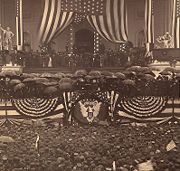
After eight rounds of voting at the Republican National Convention, Harrison defeated John Sherman 544 to 108 votes, winning the Republican presidential nomination. Harrison was elected President of the United States in 1888 in notoriously fraudulent balloting in New York and Indiana. In the Presidential election, Harrison received 90,000 fewer popular votes than incumbent President Grover Cleveland but carried the Electoral College 233 to 168.
Although he had made no political bargains, his supporters had given innumerable pledges upon his behalf. When Boss Matthew Quay of Pennsylvania, rebuffed for a Cabinet position for his political support during the convention, heard that Harrison ascribed his narrow victory to Providence, Quay exclaimed that Harrison would never know "how close a number of men were compelled to approach...the penitentiary to make him President." He was inaugurated on March 4, 1889, and served through March 4, 1893. Harrison was also known as the "centennial president" because his inauguration was the 100th anniversary of the inauguration of George Washington.
Presidential firsts
Benjamin Harrison is the earliest President whose voice is known to be preserved. This thirty-six second recording was originally made on a wax phonograph cylinder in 1889. Rutherford B. Hayes recorded for Edison earlier but the tinfoil recording is presumed lost.
In 1892, Harrison and Whitelaw Reid formed the only U.S. presidential ticket composed of candidates that were also alumni of the same university, Miami University.
Harrison had electricity installed in the White House for the first time by Edison Electric Company, but he and his wife reportedly would not touch the light switches for fear of electrocution and would often go to sleep with the lights on. In April 1891, Harrison became the first President to travel across the United States entirely by train. On June 7, 1892, Harrison became the first President to ever attend a baseball game.
Policies
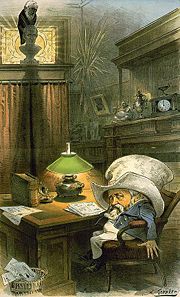
An 1890 Puck cartoon depicts Harrison at his desk wearing his grandfather's hat which is too big for his head, suggesting that he is not fit for the presidency. Atop a bust of William Henry Harrison, a raven with the head of Secretary of State James G. Blaine gawks down at the President, a reference to the famous Edgar Allan Poe poem " The Raven." Blaine and Harrison were both at odds over the recently proposed McKinley Tariff.
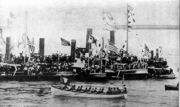
For Harrison, Civil Service reform was a no-win situation. Congress was split so far apart on the issue that agreeing to any measure for one side would alienate the other. The issue became a popular political football of the time and was immortalized in a cartoon captioned "What can I do when both parties insist on kicking?"
Harrison was proud of the vigorous foreign policy which he helped shape. The first Pan-American Congress met in Washington, D.C. in 1889, establishing an information centre which later became the Pan American Union. At the end of his administration, Harrison submitted to the Senate a treaty to annex Hawaii; to his disappointment, President Cleveland later withdrew it.
The most perplexing domestic problem Harrison faced was the tariff issue. The high tariff rates in effect had created a surplus of money in the Treasury. Low-tariff advocates argued that the surplus was hurting business. Republican leaders in Congress successfully met the challenge. Representative William McKinley and Senator Nelson W. Aldrich framed a still higher tariff bill; some rates were intentionally prohibitive.
Harrison tried to make the tariff more acceptable by writing in reciprocity provisions. To cope with the Treasury surplus, the tariff was removed from imported raw sugar; sugar growers within the United States were given two cents per pound bounty on their production.
In an attempt to battle trusts and monopolies, Harrison signed into effect the Sherman Antitrust Act in order to protect trade and commerce. This was the first Federal act of its kind.
The first international crisis Harrison had to face occurred over the fishing rights on the Alaskan coast. Canada claimed fishing rights around many of the Aleutians islands and continued fishing there despite warning by the US Navy, leading to the navy seizing several Canadian ships. The Harrison administration initiated negotiations with the British that would lead to a compromise over the fishing right in the Bering Sea.
In early 1891 Harrison ordered the navy to preparer for war against Chile after receiving an "offensive" letter from the President of Chile. A diplomatic incident that involved the murder of a Chilean sailor by an American fueled the crisis and Harrison gave a full report to the Congress in the 1891 State of the Union Address. Ultimately the administration made peace overtures to the Chilean government after the "offensive" letter was withdrawn and prosecution of the American murderer ensued.
Reelection campaign
Long before the end of the Harrison Administration, the Treasury surplus had evaporated and prosperity seemed about to disappear. Congressional elections in 1890 went against the Republicans, and party leaders decided to abandon President Harrison, although he had cooperated with Congress on party legislation. Nevertheless, his party renominated him in 1892, but he was defeated by Cleveland. Just two weeks earlier, on October 25, 1892, Harrison's wife, Caroline died after a long battle with tuberculosis. Harrison did not actively campaign on his own behalf during his reelection bid and remained with his wife. Their daughter, Mary Harrison McKee, continued the duties of the First Lady after her mother's death.
Harrison's opponent, Grover Cleveland, also did not actively campaign during the election -- the first time no candidate campaigned in a presidential election.Cleveland ultimately won the election with 227 electoral votes to Harrison's 145. Cleveland also won in the popular vote, 5,556,918 to 5,176,108. Harrison's defeat is attributed to the lack of popularity of the McKinley Tariff and the labor unrest in the western United States.
Significant events
- Sherman Antitrust Act (1890)
- Sherman Silver Purchase Act (1890)
- McKinley Tariff (1890)
- Ocala Demands (1890)
- Wounded Knee Massacre (1890)
Administration and Cabinet
| OFFICE | NAME | TERM |
|---|---|---|
| President | Benjamin Harrison | 1889–1893 |
| Vice President | Levi P. Morton | 1889–1893 |
| Secretary of State | James G. Blaine | 1889–1892 |
| John W. Foster | 1892–1893 | |
| Secretary of the Treasury | William Windom | 1889–1891 |
| Charles W. Foster | 1891–1893 | |
| Secretary of War | Redfield Proctor | 1889–1891 |
| Stephen B. Elkins | 1891–1893 | |
| Attorney General | William H. H. Miller | 1889–1893 |
| Postmaster General | John Wanamaker | 1889–1893 |
| Secretary of the Navy | Benjamin F. Tracy | 1889–1893 |
| Secretary of the Interior | John W. Noble | 1889–1893 |
| Secretary of Agriculture | Jeremiah M. Rusk | 1889–1893 |
Supreme Court appointments
Harrison appointed the following Justices to the Supreme Court of the United States:
- David Josiah Brewer - 1890
- Henry Billings Brown - 1891
- George Shiras, Jr. - 1892
- Howell Edmunds Jackson - 1893
States admitted to the Union
- North Dakota – November 2, 1889
- South Dakota – November 2, 1889
- Montana – November 8, 1889
- Washington – November 11, 1889
- Idaho – July 3, 1890
- Wyoming – July 10 [[1890]
Post-presidency
After he left office, Harrison returned to Indianapolis. He married a widow, Mary Scott Lord Dimmick, on April 6, 1896, in New York City. She was also his deceased wife's niece. His two adult children, Russell, 41 years old at the time, and Mary "Mamie", 38, did not attend the wedding because they disagreed with their father's marriage, which they viewed as inappropriate. Their mother had died only three and a half years earlier. Benjamin and Mary had one child, Elizabeth ( February 21, 1897 - December 26, 1955), who later married James Blaine Walker, a grandnephew of James G. Blaine. Their daughter, Jane Harrison Walker, later married Newell Garfield, the great-grandson of President James A. Garfield and his wife Lucretia Garfield and the grandson of James R. Garfield. Harrison went to the First Peace Conference at The Hague. He served as an attorney for the Republic of Venezuela in the boundary dispute between Venezuela and the United Kingdom in 1900. He also wrote a book entitled This Country of Ours about the federal government and the presidency that was published in 1918, after his death.
Harrison developed the flu and a bad cold in February 1901. Despite treatment by steam vapor inhalation, Harrison's condition only worsened. Benjamin Harrison eventually died from influenza and pneumonia on Wednesday, March 13, 1901 and is interred in Crown Hill Cemetery. Incidentally, Crown Hill Cemetery also holds the remains of three United States Vice-Presidents: Charles W. Fairbanks, Thomas A. Hendricks, and Thomas R. Marshall.
Legacy
- The Benjamin Harrison Law School in Indianapolis was named in his honour. In 1944, Indiana University acquired the school and renamed it Indiana University School of Law - Indianapolis.
- At Miami University, Harrison Hall houses the political science department and the Harrison Scholarship is school's most prestigious academic award.
- In 1942, a United States Liberty ship named the SS Benjamin Harrison was launched. She was torpedoed and scuttled in 1943.
- A U.S. Army post, Fort Benjamin Harrison, was established after Harrison's death in Indianapolis, but it was closed in the 1990s.
- Harrison Hall, a co-educational dormitory at Purdue University, is named after President Harrison, who served on the Board of Trustees of Purdue University from July, 1895 to March, 1901.
- The Benjamin Harrison Memorial Drawbridge over the James River in Virginia is one of the longest vertical lift bridges in the North America at 363 feet at its longest span.
- The 1968 Walt Disney musical film The One and Only, Genuine, Original Family Band was about the United States presidential election of 1888 between Harrison and rival Grover Cleveland. In the film, the campaign song " Oh, Benjamin Harrison" was modern and not really from that campaign. The song was written by the Sherman Brothers.
